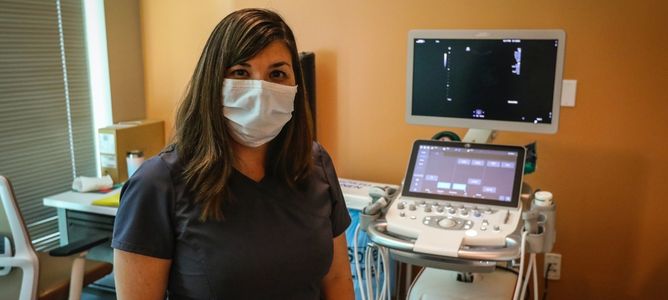Search Ashworth College

The demand for healthcare professionals has, for the most part, always been pretty steady. However, the need for qualified, well-rounded healthcare workers has increased in the past few years, thanks in part to the Covid-19 pandemic. Medical assistants and medical coders, in particular, have seen a steady rise in need. Here we will break down the similarities and differences between the two, and what’s needed to get started in both, to help you make the best career choice for you.
Medical assistants support patients in a combination of administrative tasks and clinical responsibilities, while medical coders support medical professionals behind-the-scenes.
Being in the medical field, both medical assistants and medical coders face some overlap in what they need to know to be successful in their roles. Their job titles explain a bit about what they do, but there’s so much more.
Read more: Medical Billing & Coding Day in the Life
Offering support in medical settings, medical assistants’ duties usually are a combination of both administrative tasks and clinical responsibilities, which can give you variety throughout your typical workday.
Administrative duties involve:
Clinical duties for medical assistants include:
Theresa Sinkevich, RMA and Allied Health instructor at Penn Foster Group , shares why she chose to go into the medical assisting field. "What made me interested in the field is how medical fields are always growing and medical assistance, I always viewed it as a stepping stone so you get your taste of what the medical field is."
Also offering support to medical professionals, medical coders serve a more behind-the-scenes role than medical assistants, with fewer patient interactions. They can work in hospitals, doctors’ offices, and healthcare clinics. Their duties include:
To help determine whether medical assistant or medical coding is right for you, here’s a chart that outlines the two roles’ responsibilities, interaction level, knowledge, and work environment:
| Aspect | Medical Assistant | Medical Coder |
|---|---|---|
| Interaction Level | High - Frequently interacts with patients, doctors, and other healthcare professionals. | Low - Primarily works independently, often with minimal face-to-face interaction. |
| Work Environment | Clinical setting, such as hospitals or doctor’s offices. Involves hands-on patient care. | Office-based or remote, focusing on reviewing and coding patient records. |
| Skills & Strengths | Strong interpersonal skills, ability to multitask, empathy, and clinical skills. | Detail-oriented, organized, enjoys following rules, and has an analytical mindset. |
| Knowledge Requirements | Medical terminology, basic clinical procedures, patient care techniques, and administrative tasks. | Medical terminology, coding systems (e.g., ICD-10, CPT), knowledge of healthcare regulations and billing practices. |
| Potential Career Transition | Can transition to Medical Coder with additional training, leveraging knowledge of diagnoses and procedures. | Less common to transition to Medical Assistant but possible with clinical training. |
Read more: What Jobs are in Doctors Offices?
Another difference between medical assistants and medical coders is the salary. The average salary of a medical assistant is $42,000. These are in-person jobs, working on-site within an office, making it a great job option for people who like to keep busy and be around others.
Alternatively, medical coders earn an average of $48,780 and have a few more options in where and how they work. Some hospitals and insurance companies hire medical coders on a contract basis or as part-time employees. As a contractor, you may be able to pick and choose when you want to take a job. Medical coding can also be done remotely, which can be a bonus if you’re a parent or caretaker for family members needing a flexible schedule.
It’s important to note that medical assistant careers are projected to grow at a fast pace, nearly 15% over the next decade. While there is a demand for medical coders, growth is a bit slower, with a 9% increase over the next ten years, so a job as a medical assistant may be a faster option to start your career.
Read more: Guide to Going Back to School as an Adult (Student Stories)
Another area where medical assistants and medical coders are very similar is in educational requirements. Both positions require a high school diploma to get started. Medical assistants can learn on the job, but many employers prefer to hire someone with career training. Ashworth’s Medical Assistant Career Diploma can help you learn the basics of clinical practice, like psychology, anatomy, and physiology. It also can help you prepare to sit for certification exams, which can be appealing to potential employers.
Medical coders also need a high school diploma or equivalent and career training, like Ashworth’s Medical Billing and Coding Career Diploma. The course covers information like medical terminology, how to identify certain procedures, and ethics and confidentiality laws. This program, too, can help you earn in-demand certifications. Tuition even includes a voucher to cover most of the costs associated with taking the Certified Billing and Coding Specialist (CBCS) exam from the National Healthcareer Association.
Read more: Top 11 Healthcare Certifications That Pay the Best (Without a Degree!)
Medical assistants can work as medical coders, depending on the circumstance. Within a medical office setting, it’s not unusual for medical assistants to be trained in coding practices. You will sometimes see medical assistants transition their careers into medical coding.
Read more: How to Become a Medical Coder With No Experience
Many medical assistants who enjoy their work progress to earning their license as licensed practical nurses or even registered nurses. Those who want to move up into higher roles, putting their skills to good use but not necessarily work clinically, pursue careers in healthcare administration through an associate degree.
Read more: Which Healthcare Career Is Right for You?
Ready to take the next steps towards a healthcare career? Call an Admissions Advisor at 1-800-957-5412 to learn more about our self-paced programs and affordable tuition, or enroll online today.
Let's talk about your educational goals. Call 1-800-957-5412